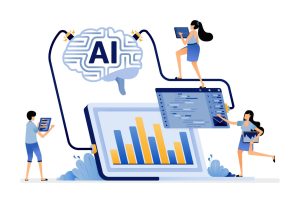
AI in Healthcare: The Future Is Closer Than You Think!
Imagine a world where diseases are diagnosed within seconds, treatments are personalized for every patient, and medical errors are almost eliminated. That’s the promise of artificial intelligence in healthcare, a rapidly advancing technology transforming the medical field.
In this blog, we’ll explore how AI is shaping healthcare, from cancer diagnosis to virtual health assistants, and the trends that predict its future growth.

What Is Artificial Intelligence in Healthcare?
Artificial intelligence (AI) refers to machines’ ability to simulate human intelligence using natural language processing (NLP) and machine learning. By analyzing vast amounts of data, AI enables machines to learn, adapt, and perform complex tasks making it an invaluable tool in healthcare for diagnosis, treatment, and patient care.
The Role of AI in Modern Healthcare
1. Diagnosing Complex Diseases
AI-powered tools are transforming the early diagnosis of chronic and life-threatening diseases:
- Cancer Diagnosis:
- Blood Disease Detection:
AI algorithms like PathAI assist pathologists in detecting cancer with precision. By minimizing diagnostic errors, they pave the way for more effective, personalized treatments.
AI-enhanced microscopes help identify harmful bacteria like Staphylococcus and E. coli in blood samples faster than traditional methods. This can save lives by enabling early intervention.
2. Virtual Health Assistants
AI-powered virtual health assistants (VHAs) streamline healthcare by:
- Managing medical records.
- Answering patient inquiries.
- Scheduling appointments.
By reducing unnecessary hospital visits, VHAs improve patient convenience while lightening the workload for healthcare providers.
3. AI in Medical Imaging
Interpreting medical images like CT scans and MRIs often takes time. AI uses deep learning to analyze these images with unparalleled speed and accuracy, enabling quicker diagnoses.
4. Dermatology Innovations
AI applications in dermatology combine deep learning and medical imaging to diagnose skin conditions, including cancer. Recent studies even show AI achieving dermatologist-level accuracy in identifying certain skin diseases.
5. Psychiatry Advancements
While still in development, AI is revolutionizing psychiatry with:
- Predictive models for treatment outcomes.
- Chatbots that simulate human interaction to support patients with anxiety and depression.
6. Pharmacy Innovations
AI is reshaping pharmacy practices by:
- Optimizing drug discovery and development.
- Enhancing medication delivery systems.
- Personalizing treatment plans for individual patients.
Comparing Traditional Methods vs. AI in Healthcare
| Aspect | Traditional Methods | AI-Powered Solutions |
|---|---|---|
| Speed | Diagnosis and treatment take time. | Instant analysis and predictions. |
| Accuracy | Subject to human error. | Minimizes errors with data precision. |
| Scalability | Limited by manual capacity. | Processes large datasets efficiently. |
| Cost Efficiency | High due to manual intervention. | Cost-effective in the long term. |
Healthcare AI Market: A Glimpse into the Future
The global AI healthcare market is booming, with a value of $19.27 billion in 2023 and a projected growth rate of 38.5% CAGR by 2030. According to a 2024 Microsoft-IDC survey:
- 79% of healthcare organizations already use AI.
- The average return on investment (ROI) for AI in healthcare is 320%.
These figures underscore AI’s potential to redefine the industry.
How AI Enhances Patient Care
1. Improved Accuracy
AI systems can analyze data from thousands of sources, offering precise insights that traditional methods often miss.
2. Cost-Effectiveness
AI reduces overheads by automating repetitive tasks, from appointment scheduling to medical record management.
3. Enhanced Patient Experience
With virtual assistants and personalized treatment plans, patients feel more engaged and valued.
Real-Life Applications of AI in Healthcare
- Hospitals: Use AI to monitor patient vitals in real-time, alerting doctors to anomalies instantly.
- Clinics: Employ chatbots to answer patient queries and suggest preventive measures.
- Pharmacies: Utilize AI to discover new drugs faster and optimize supply chains.
Challenges and Ethical Considerations
While the benefits of AI are undeniable, its adoption isn’t without challenges:
- Data Privacy: Protecting sensitive patient information is critical.
- Bias in AI Models: Ensuring fairness and equity in healthcare algorithms remains a priority.
- Skill Gap: Training healthcare professionals to use AI effectively is essential.
Why AI Is the Future of Healthcare
The integration of AI into healthcare isn’t just a technological upgrade—it’s a revolution. By enabling faster diagnoses, personalized care, and efficient systems, AI is making healthcare more accessible, accurate, and affordable for everyone.
As AI continues to evolve, one thing is clear: its role in healthcare is no longer optional but essential for better patient outcomes.


